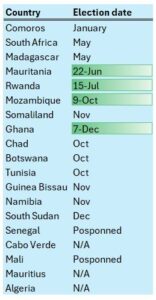Rabat, April 17, 2020 - Morocco's army has mobilised all its resources to help the health system tackle the...

With MondAfrique
The island nation of Comoros on the Indian ocean is the first African nation to inaugurate the election season on the  African continent. And if the Comoros island is an example of what’s to come, Africa’s elections are going to count for nothing, with a few notable exceptions.
African continent. And if the Comoros island is an example of what’s to come, Africa’s elections are going to count for nothing, with a few notable exceptions.
In the Comoros, the incumbent President Azali Assoumani was declared on the 16 January 2024, the winner of rigged elections that triggered riots. As of January 18, Comoros witnessed a second day of turmoil resulting in one fatality and at least six injuries. Opposition parties contested the election results, alleging fraud and bias in favor of Assoumani, who, having changed the constitution in 2018 to bypass term limits, secured a fourth term with 62.97% of the vote. Accusations of dissent crackdown and protest bans were leveled against Assoumani, who also chairs the African Union.
President Assoumani and the Comoros are a template of what African politics looks like. African leaders have no interest in quitting their presidential seats without upheaval. Aside from some exceptions, there is no such thing as smooth presidential transition. Assoumani of the Comores has been in power since 1999.
So 2024 should be a record election year for Africa. Twenty countries, accounting for 346 million voters will be called to participate to elections that will mostly be rigged and decided in advance.
However, for those of you who live un western nations and where elections are the backbone of governance, it is worth noting that Africa has long been looking to distance itself from western-style democracy. Our colleagues from MondAfrique noted, rightly so, the for the most part, the forthcoming African elections have no democratic content and standards in them, citing the fact that different factors and actors have a more direct impact on the political systems in those countries. Among the factors cited by MondAfrique is the predominant role of the military in several countries like Mali, Niger and Guinea, the strength of traditional tribal structures, the rise of Islamic values favoring tradition over the law or finally the positive image of Vladimir Putin among many of African heads of state, factors that naturally clash with Western democratic values.
So of course, Africa does not have to mimic the west. It can create its own political model. But should we be pleased that a handful of ruthless rulers and their backers will win elections in advance? Not at all. Here is a snapshot of what to expect this year as African experience another election cycle.

Rabat, April 17, 2020 - Morocco's army has mobilised all its resources to help the health system tackle the...

Tripoli, April 19, 2020 (By Rim Taher) - Already tired of the tribulations of war, Libyans in the capital Tripoli are...

Tunis, April 22, 2020 - After a month of lockdown, Tunisian hospitals have not so far suffered the overcrowding some...
Algiers, April 23, 2020 -By Amal Belalloufi: Dozens of Algerians linked to the country's anti-government protest...
Niamey, April 22, 2020 (By Boureima Hama) - With the holy Muslim month of Ramadan set to start this weekend,...
Rabat, April 22, 2020 - Moroccan police have started using a mobile application in recent days to track violators of...
Washington, April 22, 2020 - Egypt on Tuesday flew a plane of medical supplies to the United States to assist in the...
Rabat, April 21, 2020 - More than 60 cases of coronavirus infections have been recorded in a jail in southern Morocco,...
Ras Jedir, Tunisia, April 21, 2020 - Hundreds of Tunisians stranded for weeks in war-racked Libya due to the...
By Ali Abba Kaya, Djimet Wiche, and Camille Malplat in Libreville: The deaths by apparent poisoning of 44 suspected...
Acts of intimidation and allegations of vote buying marred the final round of legislative elections in Mali on Sunday...
Burkina Faso's security forces allegedly executed 31 unarmed detainees in the northern town of Djibo, Human Rights...
Tunisia's Prime Minister Elyes Fakhfakh has announced that a lockdown to fight the spread of coronavirus will be...
Angola has received a herd of more than 1,000 cattle from Chad, a government official said Monday, the latest shipment...
Niamey, April 20, 2020 - Clashes erupted in Niamey, the capital of the Sahel nation of Niger, over the government's...
Cairo, April 21, 2020 -By Menna Zaki: After showing symptoms similar to those of the coronavirus, Egyptian doctor...
April 20, 2020 - Algerian authorities have blocked a third online news website that covered the anti-government...
Abuja, April 14, 2020 (By Celia Lebur) - African countries are seething over accounts that Africans are battling...
Algerian former foreign minister Ramtane Lamamra on Thursday ruled himself out of becoming the next UN envoy to Libya,...
Algiers, April 17, 2020 - Inmates at 30 Algerian prisons are being mobilised to make personal protective equipment to...
Tunis, April 17, 2020 - Tunisian engineers have created a web-based platform that scans lung X-rays and evaluates...
Cairo, April 14, 2020 - An Egyptian policeman was killed and another wounded in a shootout Tuesday with armed...